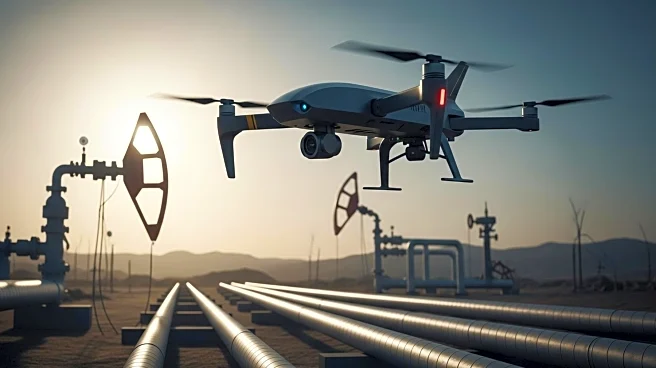What's Happening?
Recent Ukrainian drone strikes have targeted Russian oil refineries, leading to gasoline shortages in Russia and occupied Ukraine. According to sources from the Ukrainian Security Service, a drone strike on the Tyngovatovo Oil Pumping Station in the Chuvash Republic caused a fire and halted oil transportation. This has exacerbated fuel shortages, particularly in regions like the Far East, Belgorod Oblast, and Crimea. The Russian government, which typically uses subsidies to stabilize domestic gas prices, is facing challenges due to these strikes. Reports indicate that fuel prices have surged, with some areas experiencing significant increases. Additionally, Ukraine's Western allies continue to support its military efforts, with Estonia contributing 10 million euros to NATO's initiative for purchasing US-made weapons for Ukraine.
Why It's Important?
The disruption of oil supplies due to Ukrainian drone strikes has significant implications for Russia's economy and its ability to maintain stable fuel prices. The increase in gasoline prices could lead to broader economic challenges, affecting both consumers and industries reliant on fuel. Furthermore, the ongoing military aid from Western countries to Ukraine underscores the geopolitical tensions and the international community's stance on the conflict. This support may bolster Ukraine's defense capabilities, potentially altering the dynamics of the conflict. The situation also highlights the strategic use of drones in modern warfare, impacting both military operations and civilian infrastructure.
What's Next?
As fuel shortages persist, the Russian government may need to explore alternative strategies to stabilize prices and ensure supply. This could involve increasing domestic production or seeking new import channels. The continued military aid to Ukraine suggests that Western countries will maintain their support, potentially leading to further advancements in Ukrainian military operations. The geopolitical landscape may shift as countries reassess their alliances and strategies in response to the evolving conflict. Additionally, the use of drones in warfare may prompt discussions on international regulations and defense strategies.
Beyond the Headlines
The use of drones in warfare raises ethical and legal questions regarding their impact on civilian infrastructure and the environment. The strikes on oil facilities not only affect fuel supply but also pose risks to local ecosystems and communities. The international community may need to address these concerns through diplomatic channels and discussions on warfare regulations. Furthermore, the conflict's impact on global oil markets could lead to shifts in energy policies and investments in alternative energy sources.











